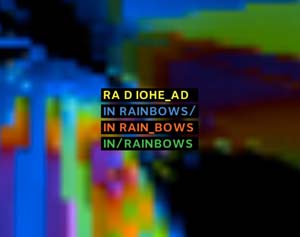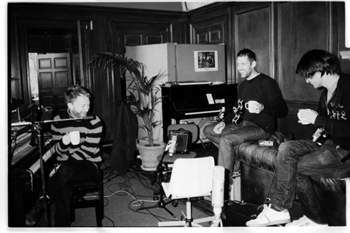 Thom Yorke, one of the artists behind the band Radiohead, hinted in 2003 that this day would come. Well, it’s here. Radiohead is releasing its seventh studio album, In Rainbows, completely on its own with no label and a pay-what-you-want price tag.
Thom Yorke, one of the artists behind the band Radiohead, hinted in 2003 that this day would come. Well, it’s here. Radiohead is releasing its seventh studio album, In Rainbows, completely on its own with no label and a pay-what-you-want price tag.
“I like the people at our record company, but the time is at hand when you have to ask why anyone needs one,” Yorke told Time after Radiohead’s contract with EMI/Capitol expired after its release of Hail to the Thief in 2003. “And, yes, it probably would give us perverse pleasure to say ‘f*** you’ to this decaying business model.”
The long-established business model is not dead yet, but Radiohead’s bypassing the record labels is another brick out of the music industry’s wall. Radiohead is still one of the biggest bands in the world, selling millions of albums and selling out concerts around the globe. Everybody — from artists to the record labels to the music industry as a whole — will be keenly following the success, or failure, of In Rainbows because it represents a new and potentially powerful way to sell music.
 “This feels like yet another death knell,” an A&R executive at a major European record label wrote to Time in an email. “If the best band in the world doesn’t want any part of us, I’m not sure what’s left for this business.”
“This feels like yet another death knell,” an A&R executive at a major European record label wrote to Time in an email. “If the best band in the world doesn’t want any part of us, I’m not sure what’s left for this business.”
The established business model worked in an analog world because recording wasn’t accessible to everybody and it was expensive. In exchange for a large percentage of sales, the record companies not only advanced hefty sums of money for recording but also took care of distribution and (to varying degrees) marketing.
In today’s digital world, artists have at their disposal affordable professional recording tools and the Internet, which provides marketing, sales, and distribution. Indie bands and unsigned artists record their music and make it available on the Internet in hopes it will find an audience willing to support it. The Arctic Monkeys come to mind as one success story.
One tactic used by bands today is to make that music free. The hope is that loyal fans will pay for premium releases, attend concerts and buy merchandise. The fans are also acting as de-facto marketers because they spread through word-of-mouth their interest in the band to friends and acquaintances.
Radiohead’s music already is widely available on peer-to-peer sites, yet the band still sells millions of albums. With In Rainbows, which will be released Oct. 10 on Radiohead’s Web site, the band is letting its fans decide what they want to pay. Free will actually cost 45p, which is the credit card handling fee.
(As an aside, pre-ordering In Rainbows was a pain. The commerce side of Radiohead is, as you would expect, arty, and it needs considerable work if Radiohead intends to release music in this manner in the future.)
 Another part of the new music business model is making premium content available to fans for a fee. Radiohead is selling In Rainbows as a £40 (about $81) special-edition boxed set (due out in December), which includes the album on CD, two vinyl records, a CD with additional songs, photos, artwork, and lyrics.
Another part of the new music business model is making premium content available to fans for a fee. Radiohead is selling In Rainbows as a £40 (about $81) special-edition boxed set (due out in December), which includes the album on CD, two vinyl records, a CD with additional songs, photos, artwork, and lyrics.
“Radiohead is the best band in the world; if you can pay whatever you want for the music by the best band in the world, why would you pay 13 dollars or 99 cents for music by somebody less talented,” a record producer who works primarily with American hip-hop artists said to Time. “Once you open that door and start giving music away legally, I’m not sure there’s any going back.”
Radiohead isn’t the only one experimenting. Prince released his latest album 3121 for free in the UK through the Mail on Sunday newspaper. Prince was initially criticized, but the nay-sayers shut up when he sold out 21 consecutive London concert dates.
The consequences of Radiohead’s and Prince’s experiments will take time to sort out. But it’s becomming clear that artists are willing to take their most valued asset — a recording, an album — and give it away for free as a loss leader, which they hope will benefit them and their fans more than the record labels.
Photo Credit: Picture of three band members drinking tea is from Radiohead’s Dead Air Space.

Radiohead can do this because they enjoyed the major label support thoughout the 90s that helped build their brand. If you’re an indie artist today your chances of achieving any kind of success with touring are zero. Good luck getting people to come to your shows when the money you’ll earn playing in dive bars won’t even pay for gas, let alone room and board or your bills at home.
In the age of the Long Tail the aggregators and distributors will profit immensely, but the producer will make so little they won’t be able to live off of it. Music will be an amateur affair.
Peter is 100% correct. What I see happening amounts to a “cheapening” of music as a whole, not just recorded music. Of course Prince can give away his new CD with the Sunday paper and still sell out concert tickets! Why is that surprising and what does one thing have to do with the other? Prince sells out venues because of all the hits he has SOLD in the past.
He and Radiohead can do whatever they want to do.
Peter’s statement “Music will be an amateur affair” is valid in our minds. Many bands have a song-writing skill, yet record on their (minus a experienced producer and this is digital NOT analog) computer at home. This is digital route is sub-standard in our minds…
But this software in their computer is “industry-standard” called Digital HD “Pro Tools” at best sounding flat and is many times without proper mixing/engineering.
We (Black Patterns From Saturn) have extra sensitive ears, but many songs on the radio today seem much thinner than ever due to the digital recordings labels have even authorized.